Notícias Espaciais (mundo afora)
Moderador: Conselho de Moderação
Re: Notícias Espaciais (mundo afora)
Nasa além de orçamento pequeno (pro tamanho dos EUA) sofre d+ com intervenção politica. +1 projeto que ja devia ter sido terminado a tempos cortado pra adequar novos planos.
- cabeça de martelo
- Sênior

- Mensagens: 37855
- Registrado em: Sex Out 21, 2005 10:45 am
- Localização: Portugal
- Agradeceram: 2604 vezes
- cabeça de martelo
- Sênior

- Mensagens: 37855
- Registrado em: Sex Out 21, 2005 10:45 am
- Localização: Portugal
- Agradeceram: 2604 vezes
- cabeça de martelo
- Sênior

- Mensagens: 37855
- Registrado em: Sex Out 21, 2005 10:45 am
- Localização: Portugal
- Agradeceram: 2604 vezes
Re: Notícias Espaciais (mundo afora)
Four huge rockets are due to debut in 2020—will any make it?
Ariane 6, Space Launch System, New Glenn, and Vulcan all have 2020 launch dates
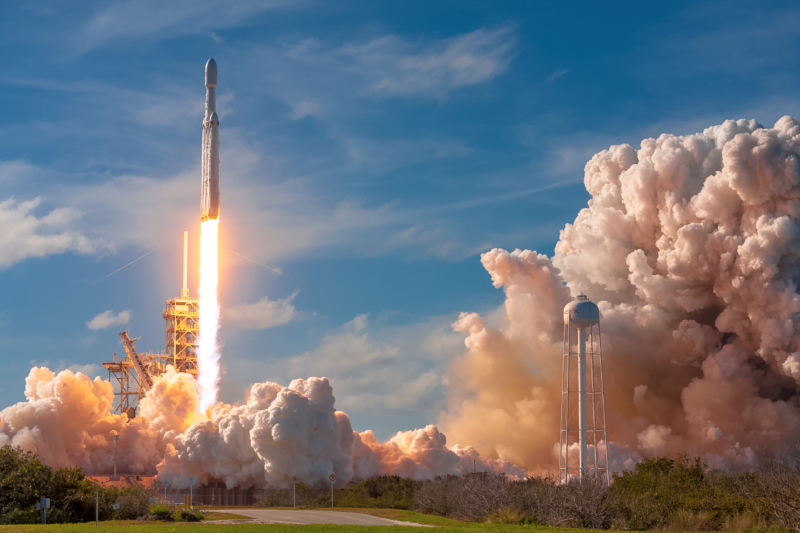
The Falcon Heavy is just the beginning of big rocket debuts ...
Rocket enthusiasts are lucky to see the debut of a handful of large, powerful rockets per decade. For example, during the last 10 years, just three rockets with a capacity of 25 tons or more to low-Earth orbit have made their debuts: the Russian Angara A5 flew in 2014, the Chinese Long March 5 in 2016, and the SpaceX Falcon Heavy earlier this year.
However, there is now a chance that up to four large and powerful rockets will make their debuts during a single year, as four boosters have maiden launches scheduled for 2020. Of course, there is also a chance that none of them will fly. Delays seem inevitable in the launch industry, especially with such large and in some ways unprecedented boosters. But given the uncertainty and the unprecedented potential, we thought it might be fun to assess whether any or all of them might make it.
Ars reached out to several launch industry experts and colleagues in aerospace journalism to gauge opinions on the viability of these launch dates. To be perfectly clear: the "confidence" in achieving a 2020 launch—and "estimated launch dates" below are at best educated guesses—is a reflection of what these informed people think may happen. Keep in mind that there are many, many variables that go into an actual launch date: funding, hardware readiness, component testing, integrated testing, software, ground systems readiness, and so much more. So caveat emptor.
Finally, as ardent fans of rockets—and seeing stuff actually getting done in space—we're rooting for all of these vehicles to make it in 2020. If you don't like these predictions, please prove us wrong.
Ariane 6
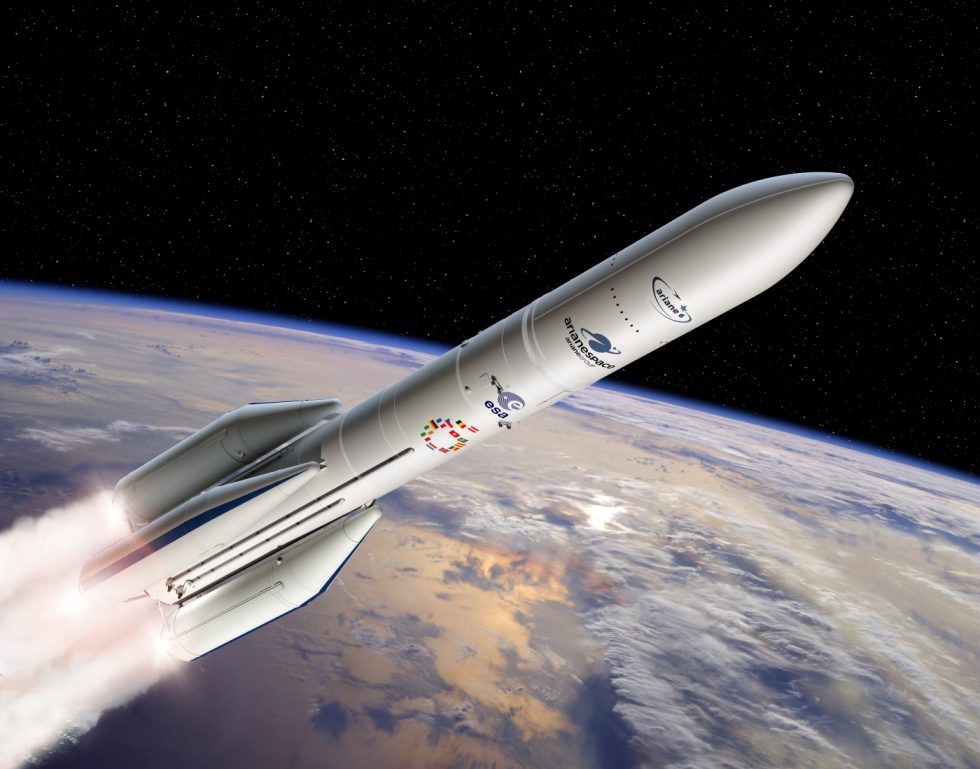
Capacity to LEO: 22 tons
Current launch date: Mid-2020
Confidence: Medium to high
Our estimated launch date: 4Q 2020
We have the highest confidence in this rocket because its various components are well into development, it is fully funded, and the rocket builds upon the existing heritage of the Ariane 5 booster. The French space agency, CNES, should complete structural work on the Ariane 6 launch site this year. Arianegroup has been hot-fire testing an updated engine for the rocket, the Vulcain 2.1, since January. And just this month, the new P120C boosters that will power the rocket off the launch pad were successfully tested for the first time.
Because of all these factors, along with a sense of urgency in Europe about the need to begin flying the Ariane 6 to become more competitive with the likes of SpaceX, we have highest confidence in the maiden launch of this vehicle in 2020. Don't book your tickets to French Guiana just yet, but maybe pencil the Ariane 6 launch onto your calendar with a modicum of confidence.
Space Launch System
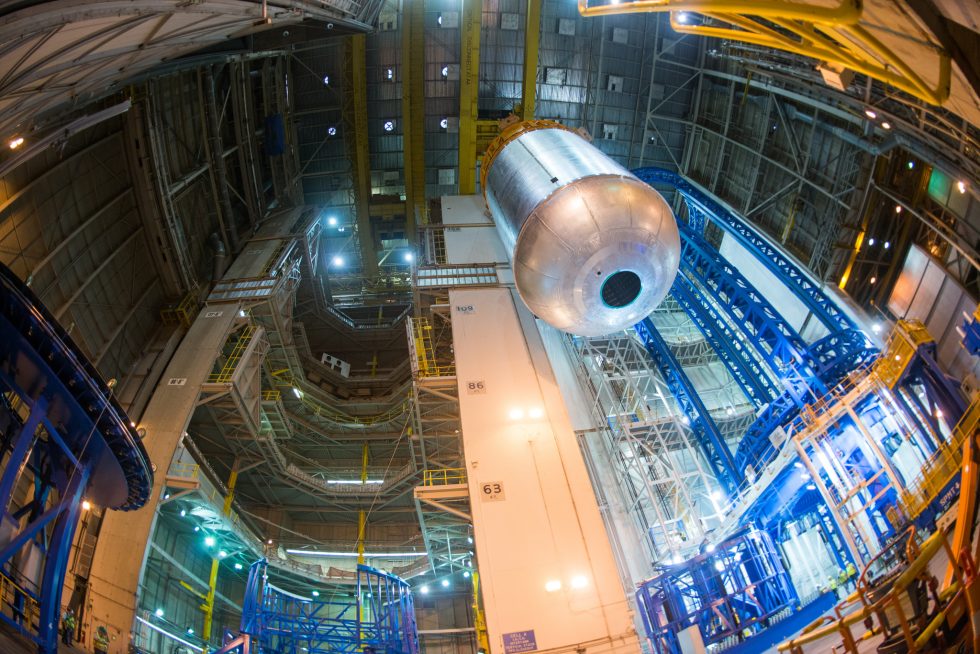
NASA is making progress on building components of its Space Launch System rocket. Here, it has completed welding of a liquid oxygen tank.
Capacity to LEO: 70+ tons
Current launch date: December 2019-June 2020
Confidence: Medium
Our estimated launch date: 2Q 2021
Yes, the Space Launch System has already slipped a lot. Work on the vehicle began back in 2011, and at the time we were told that the use of space-shuttle heritage components such as side-mounted solid rocket boosters and the shuttle's main engine would help streamline development of the world's largest rocket.
However, despite NASA's extraordinary expenditure of $2 billion annually to develop the SLS rocket, it has faced technical problems and delays from its initial launch date of November 2017. The prime contractor for the core stage, Boeing, has now begun to produce fuel tanks for the massive core stage of the rocket, but an all-up test of the core stage integrated with its four main engines won't occur until some time next year.
Experienced rocket scientists often say that the most challenging part of a rocket's development comes during this integration (when the various pieces of the core stage are assembled) and test phase. For this reason, we don't have too much confidence in a launch less than two years from now. A successful core stage test firing next year would change that.
New Glenn
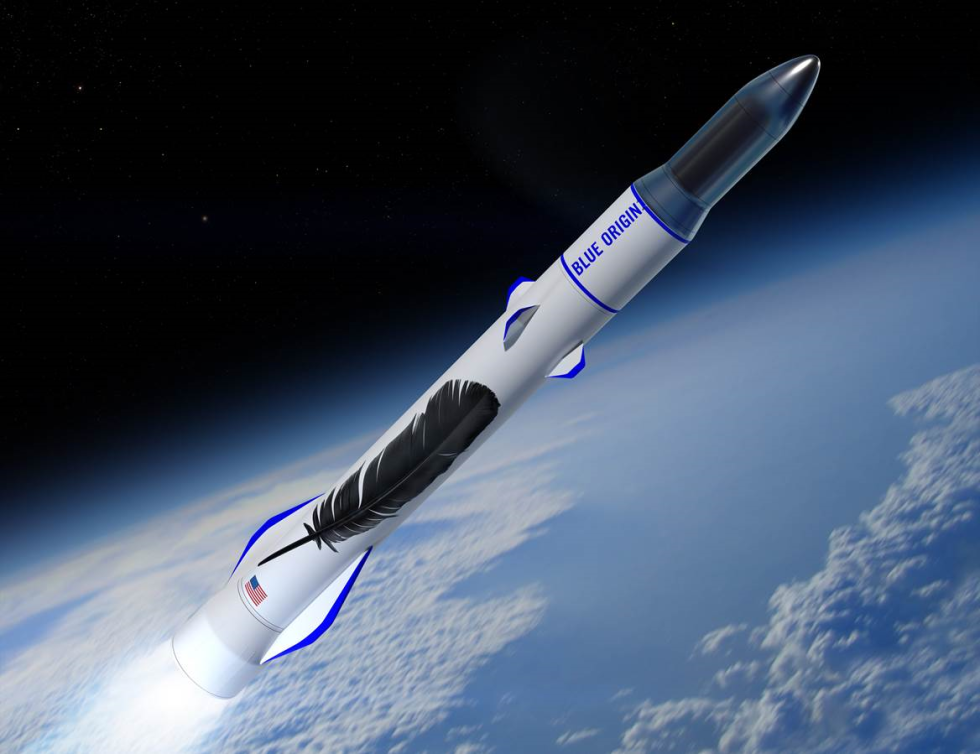
Blue Origin's concept art for a New Glenn rocket launch ascending to orbit.
Capacity to LEO: 45 tons
Current launch date: 2020
Confidence: Low to medium
Our estimated launch date: 2Q 2021
Blue Origin, backed by Amazon founder Jeff Bezos, certainly has plenty of money. It also has a huge new rocket factory in Florida to assemble the New Glenn booster, and the first stage engine, the BE-4, continues to undergo a rigorous testing plan in West Texas.
But despite these resources and a tremendous team of engineers assembled by Bezos, it nonetheless is a huge leap for the company to go from the single-engine New Shepard launch system, with 110,000 pounds of thrust, to the New Glenn booster, with seven much larger engines and its nearly four million pounds of thrust at liftoff.
Do we think Blue Origin will get there? Absolutely. Do we think it will happen in 2020? Well ... we hope it does.
Vulcan
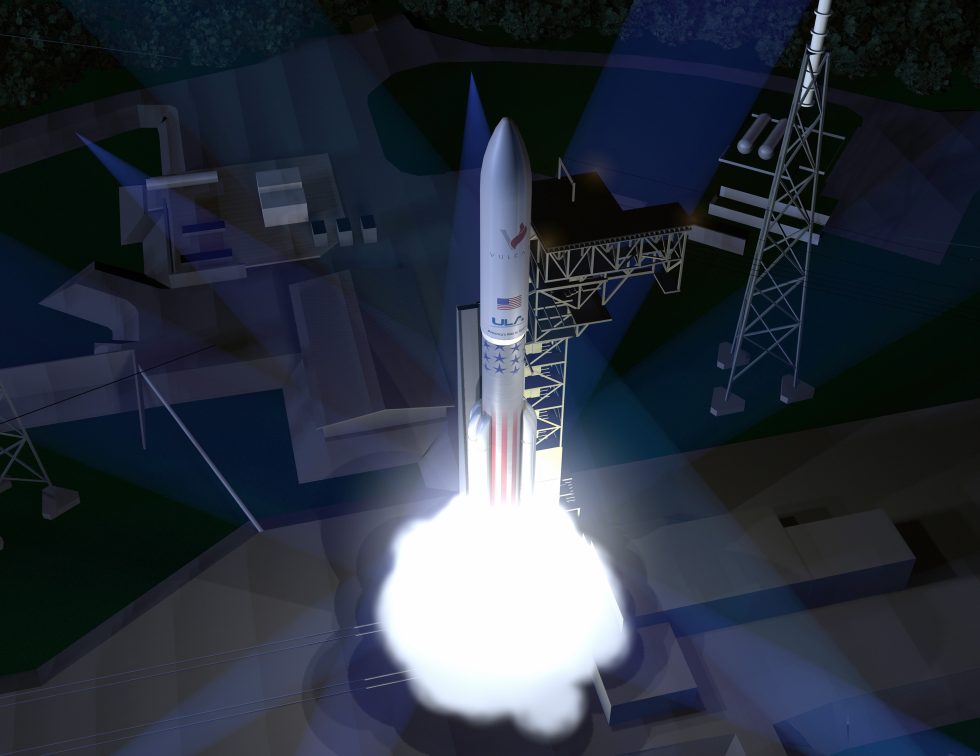
Concept art of a Vulcan rocket lifting off.
Capacity to LEO: 35 tons
Current launch date: Mid-2020
Confidence: Low
Our estimated launch date: 1Q 2022
Like ArianeGroup, United Launch Alliance (ULA) has developed a new rocket with the intention to compete with SpaceX. The company also was told by the US Congress to stop using Russian engines, and so it has to move on from the proven Atlas V rocket. (By the way, don't confuse the Vulcan rocket with the Ariane 6's Vulcain engine. They're totally different. And the Europeans will tell you they chose the name first.)
One problem with Vulcan is that it is not at all clear that the parent companies of ULA, Lockheed Martin and Boeing, have fully committed the resources needed to complete development of Vulcan. Instead, before finalizing the Vulcan rocket, ULA could be waiting for the US Department of Defense to announce the next round of Launch Service Agreement contracts. That should happen some time this summer. This may help explain why company officials always say "soon" when asked about selecting an engine for Vulcan.
The rocket also has one very prominent skeptic—Elon Musk of SpaceX. Famously, Musk has said, "I will seriously eat my hat with a side of mustard if that rocket flies a national security spacecraft before 2023." Presumably, Vulcan would need to fly a couple of missions before becoming certified for a national security launch, but even so, 2023 for a third mission does not engender confidence about a maiden launch in 2020.
More rockets still
The fun doesn't stop with these four titanic boosters. Northrop Grumman Innovation Systems (formerly Orbital ATK) is developing the large Omega rocket for a possible launch in 2021, although like the Vulcan this could be dependent upon funding from the DOD's Launch Services Agreement to reach completion.
Then there is SpaceX's Big Falcon Rocket. This would be the most ambitious rocket ever built, requiring several technical miracles before it rolls to a launch pad. Beyond that, there are serious questions about the funding needed to see through development of the super-massive rocket and a maiden launch in the early 2020s. With that said, Musk and SpaceX President Gwynne Shotwell are completely committed to the BFR. So we expect to see it some day—the sooner the better.
https://arstechnica.com/science/2018/07 ... ts-or-not/
Ariane 6, Space Launch System, New Glenn, and Vulcan all have 2020 launch dates

The Falcon Heavy is just the beginning of big rocket debuts ...
Rocket enthusiasts are lucky to see the debut of a handful of large, powerful rockets per decade. For example, during the last 10 years, just three rockets with a capacity of 25 tons or more to low-Earth orbit have made their debuts: the Russian Angara A5 flew in 2014, the Chinese Long March 5 in 2016, and the SpaceX Falcon Heavy earlier this year.
However, there is now a chance that up to four large and powerful rockets will make their debuts during a single year, as four boosters have maiden launches scheduled for 2020. Of course, there is also a chance that none of them will fly. Delays seem inevitable in the launch industry, especially with such large and in some ways unprecedented boosters. But given the uncertainty and the unprecedented potential, we thought it might be fun to assess whether any or all of them might make it.
Ars reached out to several launch industry experts and colleagues in aerospace journalism to gauge opinions on the viability of these launch dates. To be perfectly clear: the "confidence" in achieving a 2020 launch—and "estimated launch dates" below are at best educated guesses—is a reflection of what these informed people think may happen. Keep in mind that there are many, many variables that go into an actual launch date: funding, hardware readiness, component testing, integrated testing, software, ground systems readiness, and so much more. So caveat emptor.
Finally, as ardent fans of rockets—and seeing stuff actually getting done in space—we're rooting for all of these vehicles to make it in 2020. If you don't like these predictions, please prove us wrong.
Ariane 6

Capacity to LEO: 22 tons
Current launch date: Mid-2020
Confidence: Medium to high
Our estimated launch date: 4Q 2020
We have the highest confidence in this rocket because its various components are well into development, it is fully funded, and the rocket builds upon the existing heritage of the Ariane 5 booster. The French space agency, CNES, should complete structural work on the Ariane 6 launch site this year. Arianegroup has been hot-fire testing an updated engine for the rocket, the Vulcain 2.1, since January. And just this month, the new P120C boosters that will power the rocket off the launch pad were successfully tested for the first time.
Because of all these factors, along with a sense of urgency in Europe about the need to begin flying the Ariane 6 to become more competitive with the likes of SpaceX, we have highest confidence in the maiden launch of this vehicle in 2020. Don't book your tickets to French Guiana just yet, but maybe pencil the Ariane 6 launch onto your calendar with a modicum of confidence.
Space Launch System

NASA is making progress on building components of its Space Launch System rocket. Here, it has completed welding of a liquid oxygen tank.
Capacity to LEO: 70+ tons
Current launch date: December 2019-June 2020
Confidence: Medium
Our estimated launch date: 2Q 2021
Yes, the Space Launch System has already slipped a lot. Work on the vehicle began back in 2011, and at the time we were told that the use of space-shuttle heritage components such as side-mounted solid rocket boosters and the shuttle's main engine would help streamline development of the world's largest rocket.
However, despite NASA's extraordinary expenditure of $2 billion annually to develop the SLS rocket, it has faced technical problems and delays from its initial launch date of November 2017. The prime contractor for the core stage, Boeing, has now begun to produce fuel tanks for the massive core stage of the rocket, but an all-up test of the core stage integrated with its four main engines won't occur until some time next year.
Experienced rocket scientists often say that the most challenging part of a rocket's development comes during this integration (when the various pieces of the core stage are assembled) and test phase. For this reason, we don't have too much confidence in a launch less than two years from now. A successful core stage test firing next year would change that.
New Glenn

Blue Origin's concept art for a New Glenn rocket launch ascending to orbit.
Capacity to LEO: 45 tons
Current launch date: 2020
Confidence: Low to medium
Our estimated launch date: 2Q 2021
Blue Origin, backed by Amazon founder Jeff Bezos, certainly has plenty of money. It also has a huge new rocket factory in Florida to assemble the New Glenn booster, and the first stage engine, the BE-4, continues to undergo a rigorous testing plan in West Texas.
But despite these resources and a tremendous team of engineers assembled by Bezos, it nonetheless is a huge leap for the company to go from the single-engine New Shepard launch system, with 110,000 pounds of thrust, to the New Glenn booster, with seven much larger engines and its nearly four million pounds of thrust at liftoff.
Do we think Blue Origin will get there? Absolutely. Do we think it will happen in 2020? Well ... we hope it does.
Vulcan

Concept art of a Vulcan rocket lifting off.
Capacity to LEO: 35 tons
Current launch date: Mid-2020
Confidence: Low
Our estimated launch date: 1Q 2022
Like ArianeGroup, United Launch Alliance (ULA) has developed a new rocket with the intention to compete with SpaceX. The company also was told by the US Congress to stop using Russian engines, and so it has to move on from the proven Atlas V rocket. (By the way, don't confuse the Vulcan rocket with the Ariane 6's Vulcain engine. They're totally different. And the Europeans will tell you they chose the name first.)
One problem with Vulcan is that it is not at all clear that the parent companies of ULA, Lockheed Martin and Boeing, have fully committed the resources needed to complete development of Vulcan. Instead, before finalizing the Vulcan rocket, ULA could be waiting for the US Department of Defense to announce the next round of Launch Service Agreement contracts. That should happen some time this summer. This may help explain why company officials always say "soon" when asked about selecting an engine for Vulcan.
The rocket also has one very prominent skeptic—Elon Musk of SpaceX. Famously, Musk has said, "I will seriously eat my hat with a side of mustard if that rocket flies a national security spacecraft before 2023." Presumably, Vulcan would need to fly a couple of missions before becoming certified for a national security launch, but even so, 2023 for a third mission does not engender confidence about a maiden launch in 2020.
More rockets still
The fun doesn't stop with these four titanic boosters. Northrop Grumman Innovation Systems (formerly Orbital ATK) is developing the large Omega rocket for a possible launch in 2021, although like the Vulcan this could be dependent upon funding from the DOD's Launch Services Agreement to reach completion.
Then there is SpaceX's Big Falcon Rocket. This would be the most ambitious rocket ever built, requiring several technical miracles before it rolls to a launch pad. Beyond that, there are serious questions about the funding needed to see through development of the super-massive rocket and a maiden launch in the early 2020s. With that said, Musk and SpaceX President Gwynne Shotwell are completely committed to the BFR. So we expect to see it some day—the sooner the better.
https://arstechnica.com/science/2018/07 ... ts-or-not/
- cabeça de martelo
- Sênior

- Mensagens: 37855
- Registrado em: Sex Out 21, 2005 10:45 am
- Localização: Portugal
- Agradeceram: 2604 vezes
Re: Notícias Espaciais (mundo afora)
Galileu: O “GPS da Europa” ganha mais quatro satélites
Um foguete Ariane 5 descolou ontem, do Centro Espacial Europeu em Kourou, Guiana Francesa, com quatro satélites que irão fazer parte do sistema Galileo. Com estes novos satélites, o sistema de navegação europeu Galileu passa a contar com 26 satélites.
O foguete Ariane 5 é um lançador descartável que tem como objetivo colocar satélites artificiais em órbitas geoestacionárias e de enviar cargas para órbitas de baixa altitude.
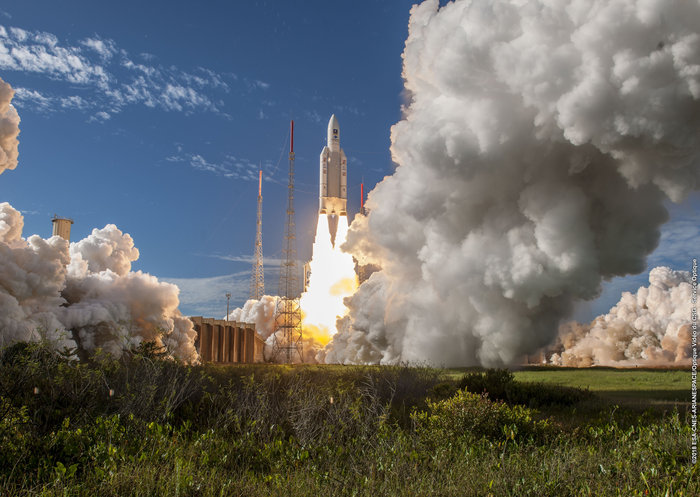
O voo VA244 do Ariane 5, operado pela Arianespace sob contrato com a ESA, descolou do Porto Espacial Europeu em Kourou, na Guiana Francesa, às 11:25 GMT (13:25 CEST, 08:25, hora local), transportando os satélites Galileo 23-26.
O primeiro par de satélites de 715 kg foi lançado quase 3 horas e 36 minutos após o lançamento, enquanto o segundo par foi lançado 20 minutos depois.
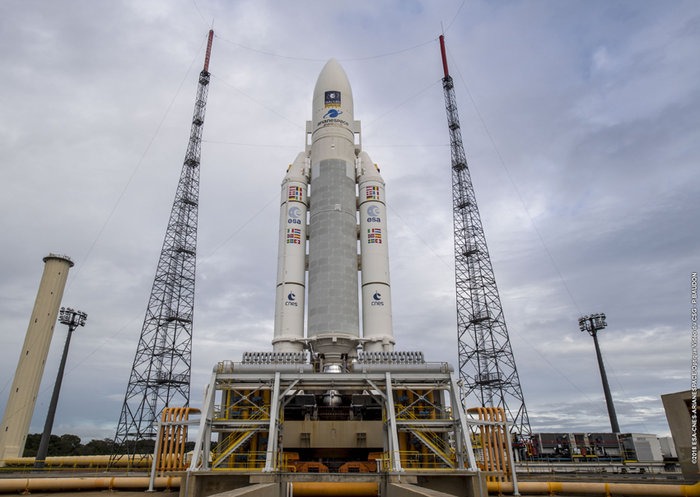
Veja o foguete Ariane 5 a decolar
O sistema Galileo tem atualmente já mais de 200 milhões de utilizadores. Ao contrário do sistema norte-americano GPS e o russo GLONASS, que são controlados por militares, o Galileo é controlado a nível civil. Além disso o “GPS europeu” promete uma geolocalização dez vezes mais precisa, comparativamente ao GPS ou ao GLONASS o que significa que, quando toda a rede de satélites Galileo estiver operacional, o sistema conseguirá indicar qualquer posição na Terra com um desvio máximo de um metro.
A rede, na sua totalidade, terá 24 satélites operacionais, e 6 de reserva, a uma altitude de 23 222 Km. O Galileo usa os mais precisos relógios atómicos – quatro em cada satélite – alguma vez usados para funções de geolocalização. O “GPS europeu” foi um projeto lançado em 1999 pela União Europeia mas só em 2020 estará totalmente completo. O total de investimento ronda os dez mil milhões de euros.
https://pplware.sapo.pt/informacao/gali ... satelites/
Um foguete Ariane 5 descolou ontem, do Centro Espacial Europeu em Kourou, Guiana Francesa, com quatro satélites que irão fazer parte do sistema Galileo. Com estes novos satélites, o sistema de navegação europeu Galileu passa a contar com 26 satélites.
O foguete Ariane 5 é um lançador descartável que tem como objetivo colocar satélites artificiais em órbitas geoestacionárias e de enviar cargas para órbitas de baixa altitude.

O voo VA244 do Ariane 5, operado pela Arianespace sob contrato com a ESA, descolou do Porto Espacial Europeu em Kourou, na Guiana Francesa, às 11:25 GMT (13:25 CEST, 08:25, hora local), transportando os satélites Galileo 23-26.
O primeiro par de satélites de 715 kg foi lançado quase 3 horas e 36 minutos após o lançamento, enquanto o segundo par foi lançado 20 minutos depois.

Veja o foguete Ariane 5 a decolar
O sistema Galileo tem atualmente já mais de 200 milhões de utilizadores. Ao contrário do sistema norte-americano GPS e o russo GLONASS, que são controlados por militares, o Galileo é controlado a nível civil. Além disso o “GPS europeu” promete uma geolocalização dez vezes mais precisa, comparativamente ao GPS ou ao GLONASS o que significa que, quando toda a rede de satélites Galileo estiver operacional, o sistema conseguirá indicar qualquer posição na Terra com um desvio máximo de um metro.
A rede, na sua totalidade, terá 24 satélites operacionais, e 6 de reserva, a uma altitude de 23 222 Km. O Galileo usa os mais precisos relógios atómicos – quatro em cada satélite – alguma vez usados para funções de geolocalização. O “GPS europeu” foi um projeto lançado em 1999 pela União Europeia mas só em 2020 estará totalmente completo. O total de investimento ronda os dez mil milhões de euros.
https://pplware.sapo.pt/informacao/gali ... satelites/
- cabeça de martelo
- Sênior

- Mensagens: 37855
- Registrado em: Sex Out 21, 2005 10:45 am
- Localização: Portugal
- Agradeceram: 2604 vezes
Re: Notícias Espaciais (mundo afora)
The Rocket for America’s Next Space Plane Just Fired 10 Times in 10 Days

Aerojet Rocketdyne
By 2021, the Phantom Express is slated to carry new satellites to orbit on a daily basis.
The Pentagon’s research arm has test-fired a new rocket engine 10 times in as many days, a critical step toward a space plane that can put satellites in orbit on a daily basis, project officials said.
The successful trial comes as the U.S. Defense Department looks for new ways to beef up and protect its orbiting constellations amid a growing space race with China and Russia.
“What we’re really trying to do is develop a next generation of launch vehicles that are able to support this new paradigm,” Scott Wierzbanowski, the engineer running the project for the Defense Advanced Research Projects Agency, told reporters during a Tuesday conference call. “We want affordability, flexibility and responsiveness is important to us and it’s going to be essential in order to have a tactical space-lift capability.”
Starting on June 26, Aerojet Rocketdyne fired its AR-22 engine an average of once every 18.5 hours, Jeff Haynes, the rocket firm’s program manager, said on Tuesday’s conference call. The 10th firing wrapped up with 68 minutes to spare, Haynes said.
“This engine is robust enough to handle the demands of frequent cycling like we did with 24-hour turnaround,” he said.
The liquid-oxygen, liquid-hydrogen-powered AR-22 engine will boost a new space plane to be built by Boeing.
“The idea of how we fly airplanes today is how we would like to … operate space-lift vehicles in the future,” Wierzbanowski said.
Dubbed the Phantom Express, the plane is being designed to carry a 3,000-pound satellite to orbit for less than $5 million.
“For this program, what we really wanted to do was design a system that was able to fly 10 times in 10 days,” Wierzbanowski said. “This really takes off the table the concern that a reusable space plane or a reusable booster can’t inherently be operable.”
The successful completion of the rocket test firings allow the program move ahead. The goal is to fly the space plane in 2021.
The plane itself — being built by Boeing’s Phantom Works advanced projects business — is being designed in a manner similar to how the firm builds commercial airplanes, Steve Johnston, Boeing program manager, said on the call.
The plane will be about 100 feet long, with a 62-foot wingspan, Johnston said. Fully fueled, the plane will weigh 240,000 pounds. It is being designed to reach Mach 10, or 10 times faster than the speed of sound.
“The series of tests that we just completed last week was a huge milestone in terms of burning down risk and our ability to turn the system around rapidly,” Johnston said.
 https://www.defenseone.com/technology/2 ... annelriver
https://www.defenseone.com/technology/2 ... annelriver

Aerojet Rocketdyne
By 2021, the Phantom Express is slated to carry new satellites to orbit on a daily basis.
The Pentagon’s research arm has test-fired a new rocket engine 10 times in as many days, a critical step toward a space plane that can put satellites in orbit on a daily basis, project officials said.
The successful trial comes as the U.S. Defense Department looks for new ways to beef up and protect its orbiting constellations amid a growing space race with China and Russia.
“What we’re really trying to do is develop a next generation of launch vehicles that are able to support this new paradigm,” Scott Wierzbanowski, the engineer running the project for the Defense Advanced Research Projects Agency, told reporters during a Tuesday conference call. “We want affordability, flexibility and responsiveness is important to us and it’s going to be essential in order to have a tactical space-lift capability.”
Starting on June 26, Aerojet Rocketdyne fired its AR-22 engine an average of once every 18.5 hours, Jeff Haynes, the rocket firm’s program manager, said on Tuesday’s conference call. The 10th firing wrapped up with 68 minutes to spare, Haynes said.
“This engine is robust enough to handle the demands of frequent cycling like we did with 24-hour turnaround,” he said.
The liquid-oxygen, liquid-hydrogen-powered AR-22 engine will boost a new space plane to be built by Boeing.
“The idea of how we fly airplanes today is how we would like to … operate space-lift vehicles in the future,” Wierzbanowski said.
Dubbed the Phantom Express, the plane is being designed to carry a 3,000-pound satellite to orbit for less than $5 million.
“For this program, what we really wanted to do was design a system that was able to fly 10 times in 10 days,” Wierzbanowski said. “This really takes off the table the concern that a reusable space plane or a reusable booster can’t inherently be operable.”
The successful completion of the rocket test firings allow the program move ahead. The goal is to fly the space plane in 2021.
The plane itself — being built by Boeing’s Phantom Works advanced projects business — is being designed in a manner similar to how the firm builds commercial airplanes, Steve Johnston, Boeing program manager, said on the call.
The plane will be about 100 feet long, with a 62-foot wingspan, Johnston said. Fully fueled, the plane will weigh 240,000 pounds. It is being designed to reach Mach 10, or 10 times faster than the speed of sound.
“The series of tests that we just completed last week was a huge milestone in terms of burning down risk and our ability to turn the system around rapidly,” Johnston said.
- cabeça de martelo
- Sênior

- Mensagens: 37855
- Registrado em: Sex Out 21, 2005 10:45 am
- Localização: Portugal
- Agradeceram: 2604 vezes
Re: Notícias Espaciais (mundo afora)
SpaceX começará a transportar Humanos para o Espaço já no próximo ano
A SpaceX, empresa privada do ramo espacial criada por Elon Musk, tem tido imenso sucesso. Em fevereiro deste ano, lançou o foguetão Falcon Heavy, um acontecimento que teve grande significado e que todo o mundo viu.
O transporte de seres humanos para o Espaço sempre foi um dos grandes objetivos da SpaceX e essa meta deverá ser cumprida em 2019.
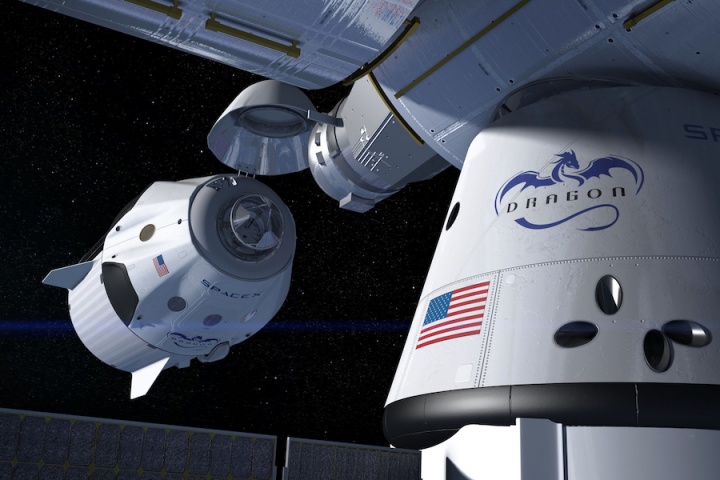
NASA quer deixar de contar com os russos…
Desde 2011, ano em que a Space Shuttle voou pela última vez, que os astronautas norte-americanos utilizam veículos espaciais russos para chegar à Internacional Space Station (ISS). Mas a NASA quer mudar isso e a SpaceX é uma das empresas que irá ajudar.
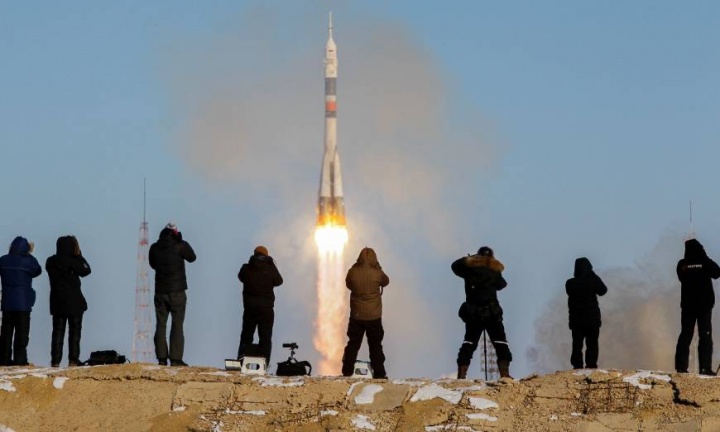
Em 2014, o governo dos Estados Unidos pagou à SpaceX 2,6 mil milhões de dólares por num veículo que fosse capaz de transportar astronautas para órbita. O mesmo acordo foi feito com a Boeing mas num valor de 4,2 mil milhões de dólares.
Desde então, as datas de lançamento de ambos os projetos têm sido adiadas. No entanto, agora já temos datas que, aparentemente, são definitivas.
SpaceX estará pronta em 2019…
Esta quinta-feira, a NASA anunciou que a cápsula Dragon da SpaceX, criada para o transporte de seres humanos, estará pronta em 2019. Em primeiro lugar, em novembro de 2018, será realizado um teste sem seres humanos abordo e passado cerca de 5 meses será realizada uma missão de teste semelhante mas que contará com a presença de astronautas.
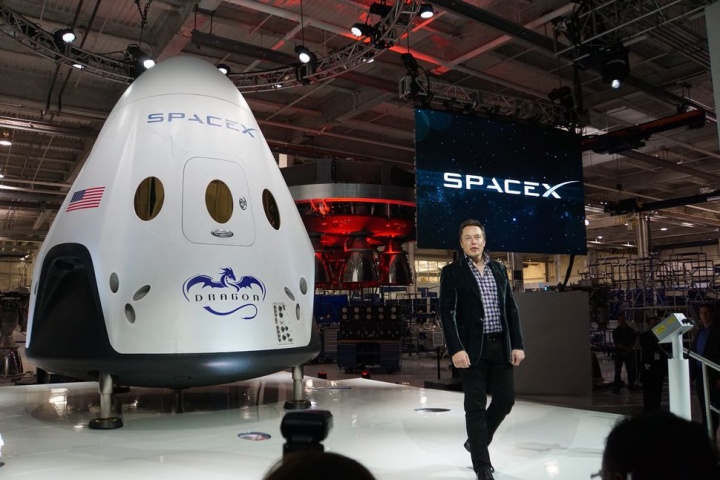
cápsula CST-100 da Boeing irá realizar também testes semelhantes. De acordo com a NASA deverão ser realizados no final de 2018/início de 2019 e em meados de 2019.
Se os testes tripulados forem realizados com sucesso, cada uma das cápsulas irá ser submetida a uma certificação da NASA.
Mas existe um pequeno problema…
Em julho deste ano, foi lançado um relatório, realizado por uma agência norte-americana responsável por supervisionar as despesas do Estado, que prevê que a SpaceX termine o processo de certificação apenas em fevereiro de 2020.
No entanto, os astronautas norte-americanos utilizam a cápsula russa Soyuz para chegar à ISS e o contrato termina em novembro de 2019. A não ser que todo o processo ande mais rápido, a NASA terá que arranjar uma solução para transportar os seus astronautas até as cápsulas da SpaceX e Boeing estarem prontas.
 https://pplware.sapo.pt/ciencia/spacex- ... paco-2019/
https://pplware.sapo.pt/ciencia/spacex- ... paco-2019/
A SpaceX, empresa privada do ramo espacial criada por Elon Musk, tem tido imenso sucesso. Em fevereiro deste ano, lançou o foguetão Falcon Heavy, um acontecimento que teve grande significado e que todo o mundo viu.
O transporte de seres humanos para o Espaço sempre foi um dos grandes objetivos da SpaceX e essa meta deverá ser cumprida em 2019.

NASA quer deixar de contar com os russos…
Desde 2011, ano em que a Space Shuttle voou pela última vez, que os astronautas norte-americanos utilizam veículos espaciais russos para chegar à Internacional Space Station (ISS). Mas a NASA quer mudar isso e a SpaceX é uma das empresas que irá ajudar.

Em 2014, o governo dos Estados Unidos pagou à SpaceX 2,6 mil milhões de dólares por num veículo que fosse capaz de transportar astronautas para órbita. O mesmo acordo foi feito com a Boeing mas num valor de 4,2 mil milhões de dólares.
Desde então, as datas de lançamento de ambos os projetos têm sido adiadas. No entanto, agora já temos datas que, aparentemente, são definitivas.
SpaceX estará pronta em 2019…
Esta quinta-feira, a NASA anunciou que a cápsula Dragon da SpaceX, criada para o transporte de seres humanos, estará pronta em 2019. Em primeiro lugar, em novembro de 2018, será realizado um teste sem seres humanos abordo e passado cerca de 5 meses será realizada uma missão de teste semelhante mas que contará com a presença de astronautas.

cápsula CST-100 da Boeing irá realizar também testes semelhantes. De acordo com a NASA deverão ser realizados no final de 2018/início de 2019 e em meados de 2019.
Se os testes tripulados forem realizados com sucesso, cada uma das cápsulas irá ser submetida a uma certificação da NASA.
Mas existe um pequeno problema…
Em julho deste ano, foi lançado um relatório, realizado por uma agência norte-americana responsável por supervisionar as despesas do Estado, que prevê que a SpaceX termine o processo de certificação apenas em fevereiro de 2020.
No entanto, os astronautas norte-americanos utilizam a cápsula russa Soyuz para chegar à ISS e o contrato termina em novembro de 2019. A não ser que todo o processo ande mais rápido, a NASA terá que arranjar uma solução para transportar os seus astronautas até as cápsulas da SpaceX e Boeing estarem prontas.
- cabeça de martelo
- Sênior

- Mensagens: 37855
- Registrado em: Sex Out 21, 2005 10:45 am
- Localização: Portugal
- Agradeceram: 2604 vezes
Re: Notícias Espaciais (mundo afora)
PLD Space signs 25-year lease at Spanish airport for engine test facilities

Construction for PLD Space's expansion at the Teruel Airport in Spain to support additional rocket engine tests for the suborbital and orbital launch vehicles it is developing. Credit: PLD Space
WASHINGTON — Spanish launch startup PLD Space plans to quadruple the size of its engine test facility at Spain’s Teruel Airport following a new 25-year lease that began this month.
The long-term lease enables the company to upgrade systems in preparation for hot fire tests lasting up to four minutes — enough to do full mission duration tests for the Arion 1 reusable suborbital launcher whose first mission is planned for next year, PLD Space chief executive Raúl Torres told SpaceNews Aug. 6 by email.
PLD Space has been at the Teruel Airport since 2014, but infrastructure limitations, namely with propellant tank accommodations, mean the company’s longest hot firing to date has been 30 seconds, Torres said. The airport, midway between Barcelona and Madrid, is about 350 kilometers north of PLD’s Elche, Spain, headquarters.
Torres said PLD Space intends to build additional support infrastructure for larger propellant tanks supporting its Teprel-1B liquid oxygen and kerosene engine. Teprel-1B powers the first stage of Arion 1, a rocket designed to carry up to 100 kilograms over the Karman Line and return via water landings with parachutes slowing the vehicle’s descent.
“The goal is to qualify the complete stage of ARION 1 in static in a full mission duration hot test with the avionics and flight software integrated,” he said.
In a press release, PLD Space said it intends to invest more than 1 million euros ($1.16 million) in new infrastructure at the airport. The lease includes an option for an additional 10-year extension, according to the company.
Torres said PLD Space plans to build a new multi-purpose test bench for stage structural testing and turbopump testing, a mission control room for different test benches, and an integration hangar for rocket engines. PLD Space builds the engines at its headquarters along Spain’s Mediterranean coast.
Teruel Airport is providing more than 13,000 square meters of land for PLD Space.
The airport supports airplane maintenance and overhauling activities. It does not have passenger aircraft flying from it today, though it does have plans for small commercial flights in the future. Torres said PLD Space is not concerned such activities will limit engine test operations.
“nstitutional support from both regional institutions and Aragon Government is enormous and we are very pleased with their interest on helping us to grow in Teruel,” he said. “I am quite confident [we have] a good relationship for the future.”
PLD Space has raised 18 million euros to date, and is currently building its first two Arion 1 suborbital rockets. The company has plans for an orbital rocket called Arion 2, for which the European Space Agency is helping study. Torres said PLD Space plans to soon start building a test bench for the Arion 2 rocket at the Teruel Airport as well.

Construction for PLD Space's expansion at the Teruel Airport in Spain to support additional rocket engine tests for the suborbital and orbital launch vehicles it is developing. Credit: PLD Space
WASHINGTON — Spanish launch startup PLD Space plans to quadruple the size of its engine test facility at Spain’s Teruel Airport following a new 25-year lease that began this month.
The long-term lease enables the company to upgrade systems in preparation for hot fire tests lasting up to four minutes — enough to do full mission duration tests for the Arion 1 reusable suborbital launcher whose first mission is planned for next year, PLD Space chief executive Raúl Torres told SpaceNews Aug. 6 by email.
PLD Space has been at the Teruel Airport since 2014, but infrastructure limitations, namely with propellant tank accommodations, mean the company’s longest hot firing to date has been 30 seconds, Torres said. The airport, midway between Barcelona and Madrid, is about 350 kilometers north of PLD’s Elche, Spain, headquarters.
Torres said PLD Space intends to build additional support infrastructure for larger propellant tanks supporting its Teprel-1B liquid oxygen and kerosene engine. Teprel-1B powers the first stage of Arion 1, a rocket designed to carry up to 100 kilograms over the Karman Line and return via water landings with parachutes slowing the vehicle’s descent.
“The goal is to qualify the complete stage of ARION 1 in static in a full mission duration hot test with the avionics and flight software integrated,” he said.
In a press release, PLD Space said it intends to invest more than 1 million euros ($1.16 million) in new infrastructure at the airport. The lease includes an option for an additional 10-year extension, according to the company.
Torres said PLD Space plans to build a new multi-purpose test bench for stage structural testing and turbopump testing, a mission control room for different test benches, and an integration hangar for rocket engines. PLD Space builds the engines at its headquarters along Spain’s Mediterranean coast.
Teruel Airport is providing more than 13,000 square meters of land for PLD Space.
The airport supports airplane maintenance and overhauling activities. It does not have passenger aircraft flying from it today, though it does have plans for small commercial flights in the future. Torres said PLD Space is not concerned such activities will limit engine test operations.
“nstitutional support from both regional institutions and Aragon Government is enormous and we are very pleased with their interest on helping us to grow in Teruel,” he said. “I am quite confident [we have] a good relationship for the future.”
PLD Space has raised 18 million euros to date, and is currently building its first two Arion 1 suborbital rockets. The company has plans for an orbital rocket called Arion 2, for which the European Space Agency is helping study. Torres said PLD Space plans to soon start building a test bench for the Arion 2 rocket at the Teruel Airport as well.
- Lucas Lasota
- Avançado

- Mensagens: 692
- Registrado em: Ter Nov 10, 2009 9:23 pm
- Agradeceram: 91 vezes
Re: Notícias Espaciais (mundo afora)
Publicado novo design do BFR.
Segunda-feira teremos mais informações!
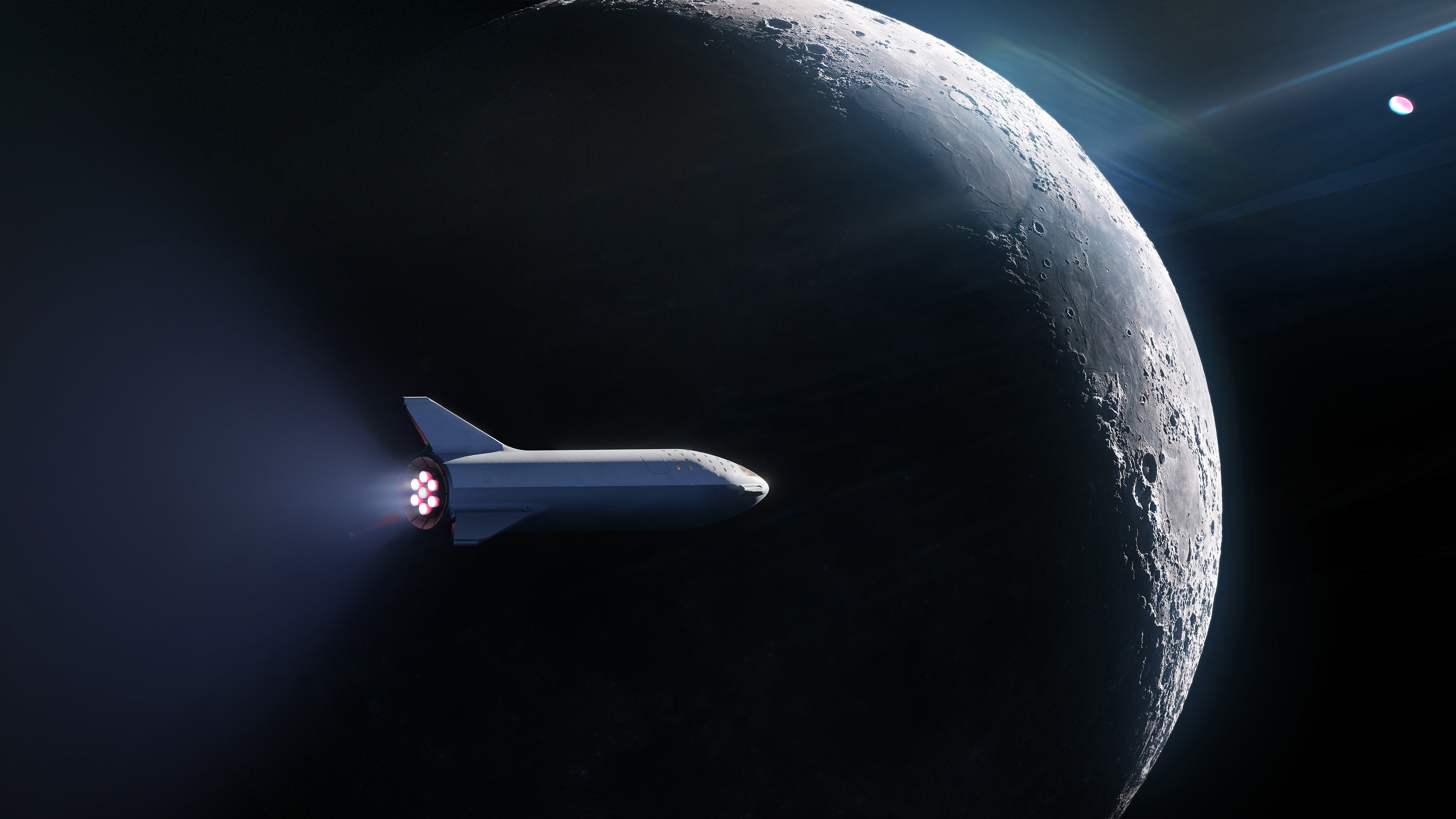
https://www.reddit.com/r/spacex/comment ... he_worlds/
Segunda-feira teremos mais informações!

https://www.reddit.com/r/spacex/comment ... he_worlds/
- cabeça de martelo
- Sênior

- Mensagens: 37855
- Registrado em: Sex Out 21, 2005 10:45 am
- Localização: Portugal
- Agradeceram: 2604 vezes
- cabeça de martelo
- Sênior

- Mensagens: 37855
- Registrado em: Sex Out 21, 2005 10:45 am
- Localização: Portugal
- Agradeceram: 2604 vezes
- cabeça de martelo
- Sênior

- Mensagens: 37855
- Registrado em: Sex Out 21, 2005 10:45 am
- Localização: Portugal
- Agradeceram: 2604 vezes
Re: Notícias Espaciais (mundo afora)
Imam Khomeini Space Launch Center
After years of extensive construction and renovation, Iran inaugurated the official reopening of the Imam Khomeini Space Launch Center on July 27th 2017 with its claimed successful launch of the new Simorgh Satellite Launch Vehicle.
-
Tutankhamon
- Intermediário

- Mensagens: 185
- Registrado em: Sex Mai 11, 2018 4:46 pm
- Agradeceram: 69 vezes
Re: Notícias Espaciais (mundo afora)
Claramente este desenvolvimento de foguetes desta categoria visa a exploração e pesquisa espaciais contribuindo com o conhecimento da humanidade .
Um regime tão PONDERADO como o iraniano certamente está interessado apenas no uso pacífico do espaço e na paz e harmonia mundiais.
Abração.
Um regime tão PONDERADO como o iraniano certamente está interessado apenas no uso pacífico do espaço e na paz e harmonia mundiais.
Abração.
Re: Notícias Espaciais (mundo afora)
Uai... estão no direito deles.Tutankhamon escreveu: ↑Qua Set 26, 2018 2:35 pm Claramente este desenvolvimento de foguetes desta categoria visa a exploração e pesquisa espaciais contribuindo com o conhecimento da humanidade .
Um regime tão PONDERADO como o iraniano certamente está interessado apenas no uso pacífico do espaço e na paz e harmonia mundiais.
Abração.
Sobretudo que defender o programa espacial iraniano é, em alguma maneira, defender o brasileiro.
"Eu detestaria estar no lugar de quem me venceu."
Darcy Ribeiro (1922 - 1997)
Darcy Ribeiro (1922 - 1997)
-
Tutankhamon
- Intermediário

- Mensagens: 185
- Registrado em: Sex Mai 11, 2018 4:46 pm
- Agradeceram: 69 vezes
Re: Notícias Espaciais (mundo afora)
Saudações Bolovo,Bolovo escreveu: ↑Qua Set 26, 2018 2:59 pmUai... estão no direito deles.Tutankhamon escreveu: ↑Qua Set 26, 2018 2:35 pm Claramente este desenvolvimento de foguetes desta categoria visa a exploração e pesquisa espaciais contribuindo com o conhecimento da humanidade .
Um regime tão PONDERADO como o iraniano certamente está interessado apenas no uso pacífico do espaço e na paz e harmonia mundiais.
Abração.
Sobretudo que defender o programa espacial iraniano é, em alguma maneira, defender o brasileiro.
Sem dúvida que direito a ter seu programa espacial eles tem, como qualquer nação supostamente soberana.
Meus comentário ia mais para o lado das recentes declarações do Pres. Hassan Rouhani a respeito do programa de desenvolvimento de foguetes ( acho que citou mísseis, não me lembro ) mais em tom de ameaça que qualquer coisa relacionada ao uso pacífico da coisa.
Acho que no caso brasileiro, mais que os conhecidos embargos e dificuldades impostas de fora, a defesa tem que vir de dentro contra a burocracia e o desinteresse e falta de um projeto verdadeiramente de estado para nosso programa espacial.
Um grande abraço.



